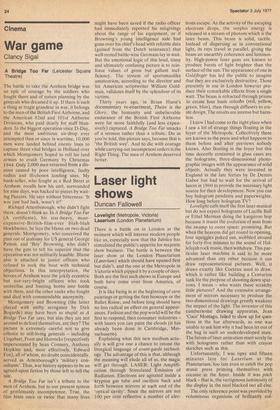Cinema
War game
Clancy Sigal
A Bridge Too Far (Leicester Square Theatre) The battle to take the Arnhem bridge was an epic of courage by the soldiers who fought there and of rotten planning by the generals who dreamed it up. 11 here is such a thing as tragic grandeur in war, it belongs to the men of the British First Airborne, and the American 82nd and 101st Airborne Divisions, who paid dearly for staff blun- ders. In the biggest operation since D-Day, and the most 'ambitious air-drop ever attempted then or since in wartime, 10,000 men were landed behind enemy lines to capture three vital bridges in Holland over which Montgomery hoped to roll his land armies to crush Germany by Christmas 1944. Only 2,000 men returned from a dis- aster caused by poor intelligence, faulty radios and ill-chosen landing sites. My bank-teller, who fought as a Red Beret at Arnhem, recalls how his unit, surrounded for nine days, was hacked to pieces by wait- ing Panzers. He says without bitterness: `It was just bad luck, wasn't it?'
Richaid Attenborough, who didn't fight there, doesn't think so. In A Bridge Too Far (A certificate), his star-heavy, most- expensive-British-film-ever blah-blah blockbuster, he lays the blame on two dead generals: Montgomery, who conceived the plan out of jealousy for US general George Patton, and `Boy' Browning, who didn't have the guts to tell his superior that the operation was not militarily feasible. Blame also is attached to junior officers who refused to rock the boat with technical objections. In this interpretation, the heroes of Arnhem were the jokily eccentric but not-very-bright officers who took umbrellas and hunting horns into battle with them, and the other ranks who fought and died with commendable anonymity.
Montgomery and Browning (the latter played with snifty arrogance by Dirk Bogarde) may have been as stupid as A Bridge Too For says, but alas they are not around to defend themselves, are they? The picture is extremely careful not to give offence to still-living generals — including Urquhart, Frost and Horrocks (respectively impersonated by Sean Connery, Anthony Hopkins and, most effectively, Edward Fox), all of whom, no doubt coincidentally, served as Attenborough's 'military con- sultants'. Thus, war history appears to be an agreed-upon fiction by those left to tell the tale.
A Bridge Too Far isn't a tribute to the men of Arnhem, but to our present system of gentlemanly incompetence. True, the film hints once or twice that many lives
might have been saved if the radio officer had immediately reported his misgivings about the range of his equipment, or if Browning's young intelligence aide had gone over his chief's dead with reliable data (gained from the Dutch resistance) that well-rested battle-wise Germans lay in wait. But the emotional logic of this loud, tinny and ultimately confusing picture is to rein- force values of gross but gallant inef- ficiency. The system of sportsmanlike amateurism, according to the director and his American scriptwriter William Gold- man, validates itself by the splendour of its victims.
Thirty years ago, in Brian Hurst's documentary re-enactment, Theirs is the Glory, the humanity and unbelievable endurance of the British First Airborne were far more faithfully (and less expen- sively) captured. A Bridge Too Far smacks of a sermon rather than a tribute. Do as you're told, this picture says, because that is `the British way'. And to die with courage while carrying out incompetent orders is the Right Thing. The men of Arnhem deserved better.


































 Previous page
Previous page